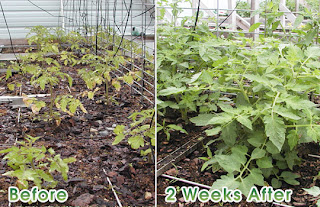Why Throw Away Those Two Week Old Fruits and Vegetables
Most people get a sick
feeling when they must throw away fresh fruits and vegetables that have become
too ripe to eat. Estimates are that as
much as 40% of fresh fruits and vegetables are thrown away because they have
become too ripe to eat.
Ideally fruits and vegetables
would ripen until they have reached their maximum in freshness and flavor, and
then cease the ripening process at that point.
This would allow the produce to be at its best when the consumer is
ready for it, and it would not become too ripe to use.
The ripening of fruits and
vegetables is caused by the ethylene gas that it produces. Once fruits and vegetables have matured on
the vine they begin to expel ethylene gas.
This ethylene gas causes the ripening process and continues until decay
begins, and the food is no longer suitable for consumption. This window of time after it is ripe but
before it begins to decay is commonly referred to as ‘shelf life’.
 |
| The benefits of neutralizing the Ethylene gas that the fruit produces. |
It is now possible to neutralize
the ethylene gas that the fruits and vegetables produce and slow the ripening
process. While neutralizing the ethylene
gas doesn’t stop the ripening process, it does slow it down. This product, BioWash Fertilizer Enhancer, is
made from 99% plant-based ingredients, is non-toxic, non-carcinogenic, and
readily bio-degradable. BioWash is
primarily used to improve how efficiently plants absorb nutrients, but can also
be used as a ‘veggie wash’ for fruits and vegetables after harvest. Washing vegetables in BioWash for 2-3 minutes
has shown to be beneficial in removing remaining dirt and pesticide residues, and
also in extending shelf life by one to two weeks.
 |
| Shelf life is typically extended by 2 weeks after ethylene gas is neutralized. |
Photos shown here re photos demonstrate
the effects of washing fruits and vegetables in BioWash after harvest. The net result is that consumers can remove
any remaining farm chemicals AND make their fruits and vegetables last longer.
 |
| The tomato on the left was washed in BioWash, the one on the right was not. |
